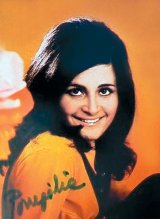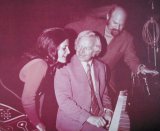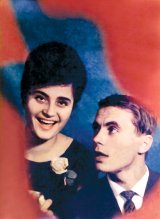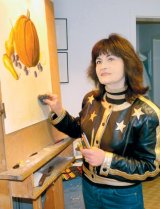The small universe of "Education" Street
- Before 1989, you were one of the most cherished and beloved stars of pop music in Romania. The song that you released, "Prieten drag" (Dear Friend), has become a national hit, sung by every romantic soul. However, you left Romania and went to Germany. WHY ?
-You printed that word in capital letters asking such a precise question that reminds me of the particular universe where I was born. My home and my reality of the 1960s was in the small world of the street called "Educației"-"Education" in Bucharest where I grew up protected by wonderful parents, dreaming romantic dreams, close to those who loved me and whom I loved, in the social context of the so-called "laboratory for the creation of the new man". I was not interested in the definition of the word "STAR". It is true that everybody met me with appreciation, admiration and love. However, the fact that my songs touched thousands of hearts seemed to me a divine miracle. I did my best to combine my activity as a student of philology with my work as a pop music singer, a dualism which has played an important role in my life. Fame was a fragile idea, I didn't consider that I could count on its steadfastness. I was a newcomer on the stage of Mamaia's fourth Festival of pop music in 1966, and I didn't expect to be rewarded with the Grand Prix. The most important composers of the 1960s - Radu Șerban, Paul Urmuzescu, Aurel Giroveanu, George Grigoriou, Elly Roman, Gelu Solomonescu, Camelia Dăscălescu - wrote songs of high sensitivity for me. However, I went to Germany. Why? In Mamaia, I met a handsome and joyful young man from the city of Braunscheig, my future husband, who gave me his whole affection and never stopped describing in fantastic colours the "free" world in which he lived and which I knew only from books. Finally, I picked the forbidden fruit, I bit into it with the pleasure and insolence of my tender age and refused to listen to the voices that asked me to change my mind. I dared to choose the "salto mortale" into the unknown.
- Your Western option ended your successful musical career much too early. Was it worth? Was your sacrifice rewarded?
- In the 1960s, my Western option had an astronomical impact, the consequences of which I was punished to endure. Officially, my music was no longer played in Romania - an insidious punishment which was probably meant to make me regret my option and live in eternal sadness. Imagine: I was a very young Romanian woman in Braunschweig. The Romanian culture was hardly known there. I was a newcomer. However, my adoptive city welcomed me like a genuine daughter. I soon discovered that there are no crucial differences between a person from Bucharest and a person from Brunswick, as some propagandists want to make us believe. People are similar all over the world, they understand each other everywhere, as long as they are educated, tolerant and have liberal ideas.
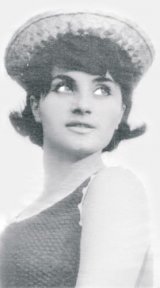
Pompilia at the beginning of her musical career
Nobody can live without music - neither in the East nor in the West. In Germany I continued to record songs with different labels ( Polydor, Ariola, BASF), I went on tour to Asia with the orchestra Ambros Seelos, I met people of different nationalities, I saw exotic landscapes, I enjoyed the sweetness of success, until one day I decided to go back to being a teacher of foreign languages, giving up the free life as a singer and starting to work in the profession I had studied at university. I was a newcomer again. I had the brilliant intuition to introduce music and theatre in my teaching methods, inviting my students to my theatre courses in English and French. It was my great joy to find out that some students experienced an immediate increase of motivation for learning foreign languages - a teaching experience of great value. Year after year our work was crowned with the highest awards in foreign languages competitions in Germany and our highschool, Hoffmann-von Fallersleben-Schule in Braunschweig, became known in the whole country. Eventually, some of my students decided to become actors, others studied foreign languages ... I cannot imagine a more precious reward for my work.
- Germany is a cold country in which human relationships are based on protocol. What did you do with your romantic nature?
- Honestly, I do not appreciate clichees trying to simplify the perception of reality, putting prefabricated labels on countries and people. However, it is true that I personally experienced the pressure of an entourage that taught me to control my temperament. It is true that this world is, in some ways, different. For example, I realized that most of my romantic comments in literary seminars were far from being highly appreciated. Romantic views are no longer fashionable - they have been replaced by efficiency..
- What did you miss most: your native country, your friends or your family?
- Most of all I missed my mother - again and again. She was my gentle friend, my wise counsellor, I missed her protection, her female power, her authority. Whenever I felt the necessity to communicate in my mother tongue, I thought of one quote from the book "Aveux et Anathèmes" by Emil Cioran: "On n'habite pas un pays, on habite une langue" - we don't live in a country, we live in a language. However, it's not funny at all to miss something or someone! When I could forget my yearning - I will not say how often - my life was without suffering, which makes me think of what the Romanian poet Lucian Blaga says: "I do not know what I'm looking for, I'm looking for my lost sky, for yesterday's sunset."
- During your period of glory, public disclosures weren't fashionable in Romania. What is hidden behind your artistic career? How did it start?
- My musical career began at the "Students' House of Culture Grigore Preoteasa" in Bucharest, when I was a student at the Faculty of Anglistic Philology. I was told that they needed a singer for the students' orchestra. So I went there and sang two songs from a film called "The Young Ones" which was very "en vogue" at that time. The band leader welcomed me at once. I was even allowed to sing in English, because I was a student of English. At that time there were strict rules prohibiting songs in foreign languages. The composer Camelia Dăscălescu and the director Virgil Sacerdoțeanu were two perfect artistic guides at the House of Culture and I had the opportunity to learn a lot from them. Our students' orchestra was led by the pianist Horia - we called him Horică - he was the soul of the group, and I would very much like to meet him again sometime, I don't know where he might be now. There were other student singers at the House of Culture such as the unforgettable Dan Spătaru, Anca Agemolu, Lili Bulaesi ... Nevertheless my encounter with music happened much earlier, when I was a child. My grandmother, mother and mother's sister had a habit of singing almost every evening. They loved to sing old romantic songs from my grandmother's repertoire. Funny stories were told and everybody laughed ... My cousin Dan and I were two young children sitting there and listening with great admiration. My mother and my aunt were singers in the CFR choir - my mother sang alto and my aunt soprano. I had incredible emotions when I saw them performing on stage. I think I was 6 when I first sang on stage the song:"Vară, vară, primavara" ("Summer, summer, spring"). I know that I loved to sing. Mom was a perfect musician and she wanted me to sing correctly. In addition, my voice had a large volume that I used to the full. When I was playing on the street with my friends, my voice rose from the group, crossed the walls, reached my mother's ears and she immediately came out to tell me to turn down the volume. I've never heard my father sing, but he was a great admirer of the ad-hoc concerts given by the female members of the family.
Side by side with Dan Spataru
- Do you remember when you first sang on TV?
- Of course I do. I do not remember the exact date, but the emotion is still alive. I sang "Green Fields" and "The Young Ones", in English, and "Amor, mon amour, my love" in Italian, in duet with Dan Spătaru. The reaction of the public was frantic. In the next days, Dan Spataru and I received an invitation to record our first record at Electrecord, and very soon, we were both invited to sing in a televised concert at the Radio Hall with the orchestra of maestro Sile Dinicu. It was a huge leap into the world of professional musicians. We both became famous almost overnight ... The concert with Sile Dinicu's orchestra is still well imprinted in my mind: the great Radio Hall, full of spectators, was in front of me, a famous professional orchestra was behind me, the stage glared with light, a volcano erupted inside me ... When the final applause exploded I thought I was dreaming...
- But do you still remember the collaboration with Radu Șerban, the author of the hits from that period?
- Of course I do. Our work sessions were held on the composer's piano, in his apartment. I was privileged to listen to his voice singing his own compositions and to watch his fingers flying on the keyboard. Music was continuously flowing in new variations. Radu Șerban was always present at recordings in the radio studio, he gave valuable guidance for interpretation and sound ... I'm still keeping the notebook with his songs in a place of honour.
- Did you have any special friends among your stage colleagues?
- Dan Spătaru, Anca Agemolu, Anda Călugăreanu ... We didn't spend much time with each other, but we sometimes enjoyed sitting together and chatting, after performances or rehearsals. Anda knew various anecdotes, she was a talented actress and story-teller ... Her cheerfulness was infectious, her company was sought and appreciated.
- They say you had a love romance with Dan Spătaru, the "Prince"of pop music of those years: he was blond, slim and won hearts easily. Could you skech his portrait? There are onlz few people who remember him, and some young people do not even know him.
- Accessibility has its limits. I think it's necessary to defend my privacy. The Fox in "The Little Prince" by Antoine de St. Exupery, says that we can only see well with our heart. I agree with that and in my case, I can see better with a heart that defends its secrets.. Dan Spătaru was a dear friend, a man of integrity, dignity, commom sense, a patriot in the best sense of the word, an artist that his fans worship like a sacred image. A recently published book has been dedicated to him. I highly recommend it to anyone who would like to find out more about the life of Dan Spătaru.
- In general, what role has love played in your life?
- Life cannot exist without the supreme value called love. I feel it. We give it and receive it, each of us in his own way, but who could say that he knows the secrets of the soul he loves? The heart has reasons that reason cannot know, says Blaise Pascal. Or how does the lyricist Constantin Cârjan define love in the song "Prieten drag"? "Love, yes, it's just a distant dream, too distant a dream, even too beautiful to be true". Is that so? At the end of the song the poet turns back to his initial idea and says: "But if you still believe that love is only a simple dream, forgive me that I wrote this letter to you." These are words which, in symbiosis with the emotional impact of the music, go straight to romantic hearts like mine.
- If you could start your life all over again, what would you change?
- I would not change anything. A change would mean that I'm not grateful for the generosity with which life has rewarded me. I am satisfied with the structure I have given my life. Maybe I would be tempted to study again at a conservatory of music, at an art institute ... The prospect of being a newcomer again would not scare me, on the contrary, I would be delighted.
- You look fantastic, Mrs. Stoian! How do you fight against time, against age and how do you cope with loneliness among strangers?
- In high school I read Ovid's "Tristia" for the first time. I was very much impressed by the verses in which the poet confesses that he cries whenever he remembers the night when he was forced by emperor Augustus to leave Rome and start his exile in Tomis, Romania, where he lived among strangers. " Cum repeto noctem qua tot mihi cara reliqui, Labitur ex oculis nunc quoque guta meis." These verses showed me that sadness, memories and yearning, can be a creative source and renew the joy of living: "la joie de vivre".
- Your recipe for beauty is certainly influenced by values which are lost today. How do you renew your spiritual and moral energies ?
- If I had a recipe, be sure that I would not keep it to myself. I would publish it in a new version of the Romanian fairy tale "Tinerețe fără bătrânețe și viață fără de moarte" ("Youth without old age and life without death") ... In fact, I am convinced that the spiritual and moral energies are within everyone's reach. Anyone who makes the effort of looking around, can easily collect them from art, faith, family, physical activities, foreign languages, travelling, friends, from the solidarity with more vulnerable, from social commitment ... I choose from each of these categories according to my to my priorities -"variatio delectat", as they say in Latin.
- Christmas is coming. Is it a nostalgic or a joyful celebration for you? How do you celebrate?
- Indeed, Christmas is knocking at the door. I imagine that the carol singers have started to go round in Bucharest, singing: "Steaua sus răsare, ca o taină mare" - "the star rises up like a great mystery ", that the birth of the divine child is celebrated with joy, that everybody will soon smell the irresistible fragrances of our delicious traditional dish "SARMALE" coming from all the kitchens throughout the city, that all children's eyes will be shining brighter than usual, waiting for the presents of the holidays. In my childhood, the most amazing miracle was the Christmas tree secretly decorated by my mother and an orange which could be bought only once a year. These old, blessed images are hung up in my imaginary tree every year. And as every year, I enjoy the overall happiness, hoping that peace, harmony and love be with us and that the pure light of nativity will bring good news. Happy Holidays, a good New Year to you and the readers of "Formula As".
